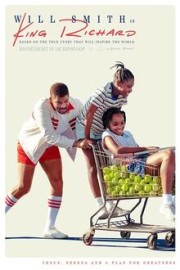King Richard
“King Richard” is, ultimately, a movie about sports. Of course it was going to be up my alley.
Richard Williams is someone who stood apart from other sports parents, who put so many expectations on their children it borders on abuse, and someone who fits the mold in his own way. Both things can be true. Maybe he did push Venus and Serena Williams too much in his pursuit of their greatness, but since they’ve achieved the greatness he saw for them, maybe he accomplished what he set out to. Especially when you consider he also puts family and them enjoying themselves as important. They were kids, after all.
Over the years, I did gymnastics, soccer, bowling and tennis growing up. My parents never saw them as a potential for future greatness, although bowling was something I grew to love and spent a lot of years working to be better. As a result, I never had the pressure to be great at sports thrust upon me. That said, feeling pressured to be great while also having your own timetable for that greatness is a tension that is universal. “King Richard” illuminates that exceptionally well.
Having a movie about the father of great athletes, and not so much the athletes themselves, feels like a challenge, but because Richard Williams is played by Will Smith, we are, naturally, going to become engage with the story in Zach Baylin’s screenplay. Smith played a father who struggles to do right by his child in “The Pursuit of Happyness,” as well, but Richard Williams is a different type of father. He’s had a “plan” for his girls since before they were born, and he’s committed to sticking with it, even if he is flying in the face of conventional thinking in the sport. He knows what he’s set up his daughters for; just because high-priced coaches like Paul Cohen (Tony Goldwyn) and Rick Macci (Jon Bernthal) disagree doesn’t mean he’s wrong. It doesn’t mean he’s right, though.
Richard is so much the center of the film that Venus (Saniyya Sidney) and Serena (Demi Singleton) don’t really register as characters a lot of the time. That’s a shame, but seeing as though the women are both executive producers on the film, they are probably fine with it. It does throw off the balance of what we typically expect from sports movies, and it also takes the pressure off of Sidney and Singleton to be the center of the film. This is Smith’s show, but the young actresses are given strong moments along the girls’s trajectory. Seeing Serena sneak her way into competing, and watching Venus try to navigate the professional world, we get glimpses of the women whom have inspired a generation of athletes. It makes me wonder what a movie focused on them would have been like; it’s one of the rare biopics where I would like to see a follow-up.
The climax of the film is as thrilling a sports climax as we’ve seen. By that point in the film, Richard has had to take a step back and let his daughter take the lead. Watching her succeed, or fail, on her own is what every parent needs to be able to handle. Seeing Richard do that makes him more of a loving father than we’ve seen throughout the film. Seeing the evolution of Richard to get to that point is one of the great pleasures of Smith’s performance, especially when his wife (Aunjanue Ellis) has to lay into him on how he’s removed agency from his daughters in what is ultimately their lives. It’s a fantastic scene, and the pivot point in the story.
I’m not a father myself, but I remember growing up with pressure from my parents to live as they lived. I think that’s part of why, even though the perspective in “King Richard” is right there in the title, I wish we got more perspective of Venus and Serena in this film. The ending gives us that. That being said, this is a winner, and surefire crowd-pleaser from all involved.










